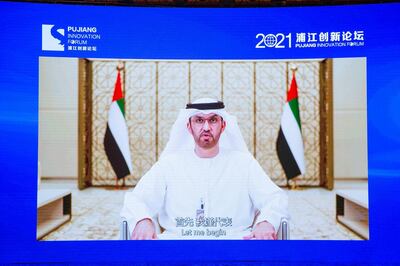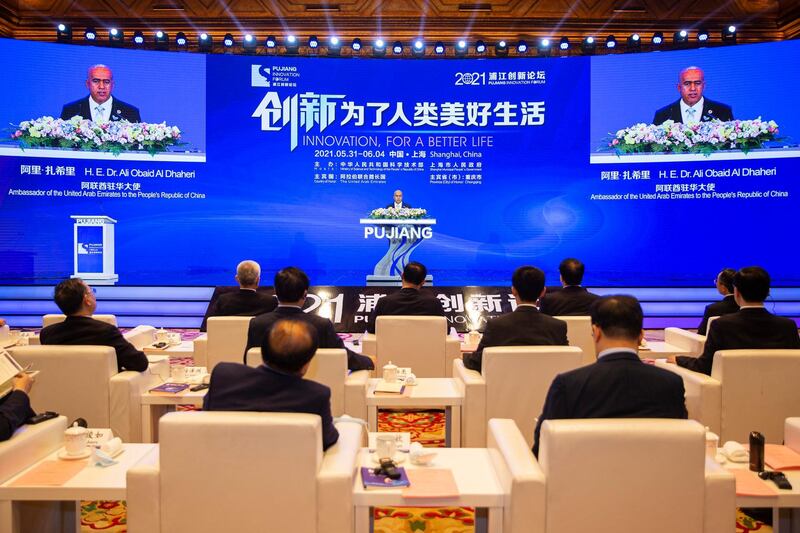The UAE will deepen ties with China and further collaborate in knowledge-based sectors that offer potential opportunities in renewable energy, life sciences and agricultural technology under its new strategy to expand industrial output.
The two countries’ model of cross-border collaborative innovation through advanced technology has “set the standard” that is vital for tackling future challenges, said Dr Sultan Al Jaber, the UAE’s Minister of Industry and Advanced Technology.
“Together we are proving that when countries collaborate to innovate, costs come down, economic opportunities go up and society benefits,” he said in an online keynote speech at the 2021 Pujiang Innovation Forum held under the theme of “Innovation for a better life for mankind”.
The two countries have had close collaboration to address global challenges such as the Covid-19 pandemic, with vaccines developed in China in record time distributed widely across the UAE, leading to one of the world’s fastest inoculation campaigns.
They have also joined forces on renewable energy projects such as Noor Abu Dhabi, the world’s largest single-site solar photovoltaic plant that produces 1.2 gigawatts of clean power from 3.2 million solar panels installed over an area of 8 square kilometres.
“Our two countries will soon set a new benchmark in the renewable energy space with the Al Dhafra Solar PV project, which will be almost twice the size of Noor and which has set a record low tariff of 1.35 cents per kilowatt,” said Dr Al Jaber during the forum.

The UAE and China have numerous opportunities to use their partnership to drive traditional and emerging industry innovation in creative and commercially viable ways, he said.
Dr Al Jaber called on the two countries to explore the potential of zero-carbon hydrogen and develop sustainable farming methods using advanced technology to feed a growing world population while reducing their carbon footprint.
He also highlighted the potential for collaboration in the field of life sciences to create new medicines, cutting-edge treatment and valuable biotech businesses.
The UAE is refocusing its industrial strategy “around leveraging the power of breakthrough [technology], to build resilience into our core industries,” he said.
It has set a 10-year national strategy to expand the industrial sector and increase its economic contribution from Dh133 billion to Dh300 billion by 2031.
Dr Al Jaber urged innovators and entrepreneurs to take advantage of the attractive business environment in the UAE and add value in the industrial sector through innovation.
“To create a culture of innovation [means] going beyond business as usual,” he said.
This entails directing investment into research and development, setting aside capital for commercialisation and establishing supportive policy and legal frameworks, said Dr Al Jaber.
The UAE is redesigning its R&D and commercialisation strategy to ensure that the most promising industries are incentivised first.
“We are establishing a more efficient ecosystem to turn groundbreaking ideas into marketable products as we extend an open invitation to the world to join us on this journey of value creation and innovation,” he said.
The UAE, which relied on the pearl industry from the late 19th century to the second decade of the past century, has evolved into a global air transport and logistics centre, in addition to turning its hydrogen economy into a centre for renewable energy and setting bold ambitions for space exploration after it sent the Arab world’s first probe to Mars.
“Building an ecosystem that stimulates innovation is no longer optional. It is essential for countries to compete, succeed and fulfil their economic potential,” said Dr Al Jaber.
“It is why we encourage co-operation beyond our borders – because together we are smarter, more agile and more resilient.”
The UAE was the "country of honour" for the first time since the forum's inception in 2014. More than 1,500 delegates attended the forum, most of them remotely as it pivoted to an online conference.








